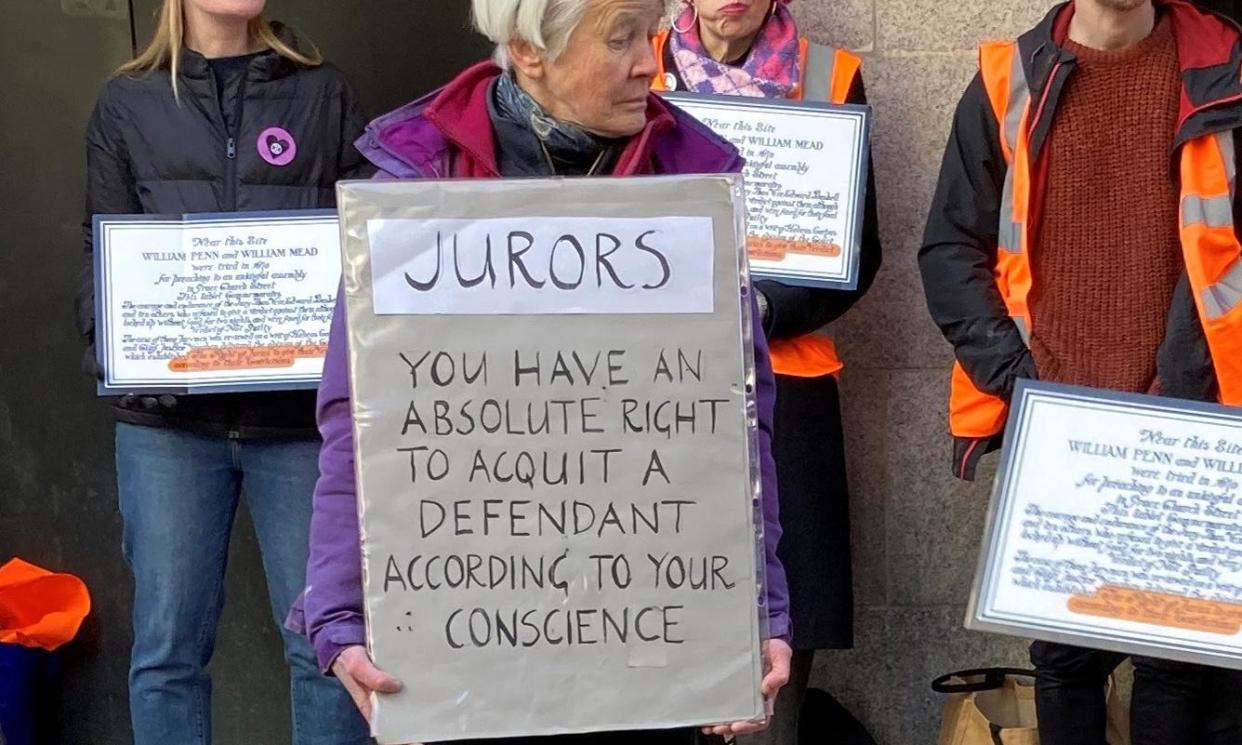Prosecution of woman for climate trial sign not in public interest, court told

The prosecution of a woman for contempt of court for holding a sign reminding juries of their rights is not in the public interest, the high court has been told.
During a hearing on Thursday, the court heard arguments for and against an attempt by the solicitor general to bring a case against Trudi Warner, 69, who was charged last year for holding a sign – outside the trial of climate activists – reminding juries of their right to acquit a defendant based on their conscience, a principle known as jury equity.
Warner was protesting against restrictions in a series of trials of climate activists imposed by Judge Silas Reid at inner London crown court, which prevented defendants from mentioning climate change, insulation or fuel poverty in front of a jury.
Her sign referred to a famous marble plaque in the Old Bailey celebrating the independence of jurors in the “Bushel’s case” of 1670, in which a jury refused a judge’s direction to find defendants guilty.
Warner was referred to the attorney general for contempt of court after returning to court with a sign. If convicted, she faces a potential jail sentence of up to two years and an unlimited fine.
Aidan Eardley KC, representing the solicitor general, told the court that Warner should be prosecuted “to maintain public confidence” in the independence of the jury system and that if the she goes unpunished, similar acts are “likely to propagate”.
Eardley said the prosecution did not need to show that a particular trial had been influenced or impeded to prove that Warner had committed a criminal offence under common law, just that there was a risk of serious interference.
Warner’s prosecution has sparked a series of escalating protests under the banner of Defend Our Juries. In February, hundreds of people urged the incoming solicitor general to stop legal action against Warner, but received no response.
Several sign-holding protesters, including Laura Kaarina Korte and Indigo Rumbelow, have been arrested and interviewed but no other charges have been levied. Most of those involved have not faced any consequences for their actions.
Outside the Royal Courts of Justice, where Warner’s hearing is being held, about 50 people silently held similar signs. Activists have also been doing so throughout the week outside crown courts across England and Wales.
Eardley accepted that Warner’s actions were “not a violent confrontation, not a vocal one”.
But he told the court that she had deliberately targeted jurors going into the court, most of whom were in their first week of jury service, “instructing, encouraging and inciting them to go about their task in a particular way”.
Warner’s legal team responded that she had not interfered with the process of justice and said her actions were protected by freedom of speech laws.
Clare Montgomery KC said Warner had not spoken to or directly engaged with anyone waiting to enter the court, and it was not unlawful or improper for members of the public, including jurors or potential jurors, to know about the principle of jury equity or to be made aware of it outside the precincts of a court.
Even if there was any risk of the jury being influenced, she argued that the judge’s directions to jurors should easily have mitigated that.
Eardley challenged the idea that Warner was engaging in “some kind of abstract debate” about the constitutional role of juries.
He said the message of Warner’s placard was not correct, saying jurors do not have a “legal right” to acquit according to their consciences, and should instead go about their task based solely on what they hear in court.
“The existence of jury equity is not a forbidden item of knowledge that jurors cannot be informed about,” Montgomery responded. “It is a fact of constitutional reality that that power, duty, prerogative exists.”
The government has continued to try to restrict what protesters can say in court. In March, the court of appeal ruled that “beliefs and motivation” of a defendant do not constitute lawful excuse for causing damage to a property, effectively removing one of the last defences for protesters who commit criminal damage.
Justice Pushpinder Saini will give a judgment as to whether Warner’s case will proceed to a full hearing on Monday.

 Yahoo News
Yahoo News 
